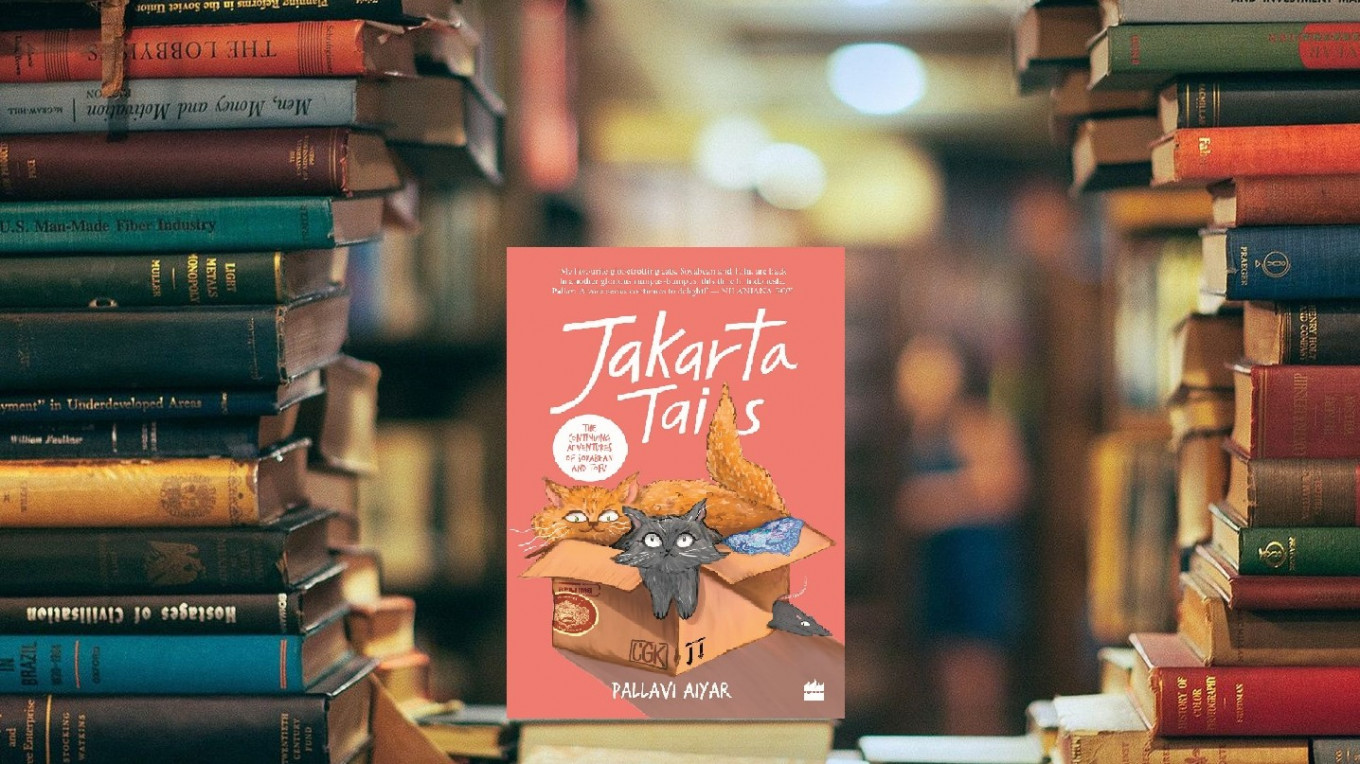Popular Reads
Top Results
Can't find what you're looking for?
View all search resultsPopular Reads
Top Results
Can't find what you're looking for?
View all search results‘Jakarta Tails’: A cat’s-eye view of human flaws
Writer Pallavi Aiyar and her globetrotting cats, Tofu and Soyabean, return for another adventure, this time, in Indonesia.
Change text size
Gift Premium Articles
to Anyone
A
uthor and foreign correspondent Pallavi Aiyar returns with a new novel, Jakarta Tails – a sequel to Chinese Whiskers: The Adventures of Soyabean and Tofu.
In the new book, available on Amazon, Soyabean and Tofu, two alley cats from Beijing, have recently moved with Mr and Mrs A, their human family, to Jakarta, where their adventure continues.
The award-winning writer has spent two decades reporting for Indian and international publications from across China, Europe, Indonesia, Japan and India.
She has also written several books, both fiction and non-fiction, including a memoir of reporting from China, Smoke and Mirrors, and one on Europe: Punjabi Parmesan.
The mother of two boys and two cats has also penned a book about balancing motherhood with work called Babies and Bylines.
“I have a new book, Orienting: An Indian in Japan that examines the contradictions of contemporary Japan out later this year,” Aiyar told The Jakarta Post over email from Madrid, where she is currently based and the country where her diplomat husband is from.
Educated in India and England, Aiyar has a wide range of hobbies, from singing (she was a member of the South Jakarta Community Choir) and taiko (Japanese drumming) to reading. “Reading is my life’s work, even more than writing,” she said.
Meet the author: Pallavi Aiyar is an award-winning foreign correspondent and author of several books, both fiction and non-fiction. (Courtesy of Raiyani Muharrama/-)It seems like the adventure continues for Tofu and Soyabean. Can you tell us more about them?
Soyabean and Tofu are two Chinese cats that are adopted by a human family, Mr. and Mrs. A when they are kittens.
Tofu is a dustbin cat, born into a large litter and suffers from a cat version of post-traumatic stress syndrome, which makes her moody and skittish, but she is wise beyond her years. She comes to rely greatly on Soyabean for learning the emotional tools of coping with humans and their unfamiliar ways.
Soyabean is an extrovert: a gorgeous, bright orange cat with an inflated sense of self whose passion for food at times threatens to override all good sense.
Mr. and Mrs. A are expats who travel the world and take the cats with them. So far, the cats have had heart-stopping adventures in Beijing and Jakarta involving contaminated pet food companies, mysterious viruses and fake news networks. An outing in Tokyo is likely soon!
Do you have a real cat at home?
I do indeed. Two cats called Caramel and Tofu who have very much been my muses when it comes to the novels. They are currently 14 years old and have lived with us in five different countries: China, Belgium, Indonesia, Japan and Spain, making them contenders for the world’s best traveled cats.
Through them I have encountered a whole new feline-centered world of vets, cat feeders, animal rights activists and feline dental hygiene advocates, many of whom have wormed their way into the novels as characters.
Trying to imagine our lives through Caramel and Tofu’s bemused, sometimes uncomprehending, eyes holds up a valuable mirror to human foibles.
Their latest adventure brings them to Jakarta. Any special reason for this?
I lived in Indonesia for four years between 2012 and 2016, a country I fell in love with. There was so much that resonated about Jakarta for an Indian like me, from the language to the way that the day was punctuated by calls to prayer.
Bahasa itself comes from the Sanskrit word bhasha, which means language. The imagery of the Ramayana and Mahabharata, epics that are integral to Indian culture, was everywhere. The names of people felt familiar.
And, of course, the challenges facing our countries were very similar too: deep-seated corruption, creaking infrastructure, yawning inequalities and the need to respect pluralism by fighting against religious intolerance.
What do you think of Indonesia?
Above all I came to love and respect the kindness and gentleness of the people of Indonesia […]. Indonesia will always be my home away from home.
Also, given its size and strategic significance, Indonesia is possibly the most under-appreciated country in the world. I am still not quite sure why it punches so below its weight on the global stage. After all, it is the world’s fourth-most-populous nation and third-largest democracy.
It is a Muslim-majority nation but also a pluralistic country that has done a remarkable job of weaving together unity from its incredible diversity.
However, I do worry about trends that indicate a growing intolerance of minorities and also about the role of social media and fake news in worsening polarization. That’s why I chose to focus on these as the main points of tension and drama in Jakarta Tails.
Can you tell a bit about Jakarta Tails’ storyline?
Soyabean and Tofu have recently moved to Jakarta with their human family and are slowly getting used to their new setting.
But just as they are settling into a tropical idyll of frangipani trees and long snoozes, strange goings on in the neighborhood have them on alert. A rat is skulking about in the garden, a mysterious neighbor is making life difficult for everyone and the family’s beloved driver is attacked by a vicious mob.
Separately, Mrs. A, a journalist, is fast discovering that under Indonesia’s surface calm, communal tensions are rife. As events snowball, the cats find themselves unwittingly sucked into a dangerous fake news network whose aim is to upset the country’s fragile religious harmony.
Any special message that you try to deliver in Jakarta Tails?
The message is clear: there is strength in embracing diversity and the values of pluralism need to be defended. Ultimately it doesn’t matter if you are a black cat or a white cat but whether or not you are a good cat.
And the same goes for humans. Our beliefs about what divides us from others are often misinformed. Just as in the book, Tofu the cat comes to become best friends with Tikus the rat, a creature she once believed was repulsive. If humans dig a bit deeper, we might find nothing but prejudice at the bottom of our convictions.












